Weiming Jiang
Discriminative Local Sparse Representation by Robust Adaptive Dictionary Pair Learning
Nov 20, 2019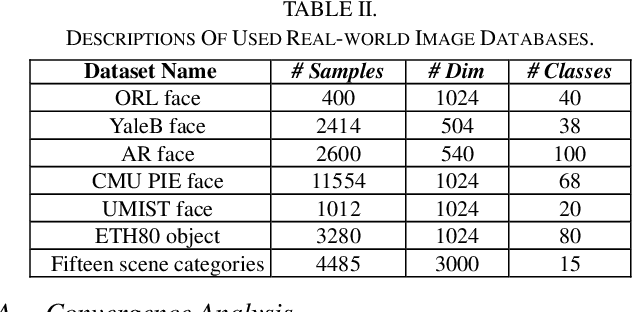
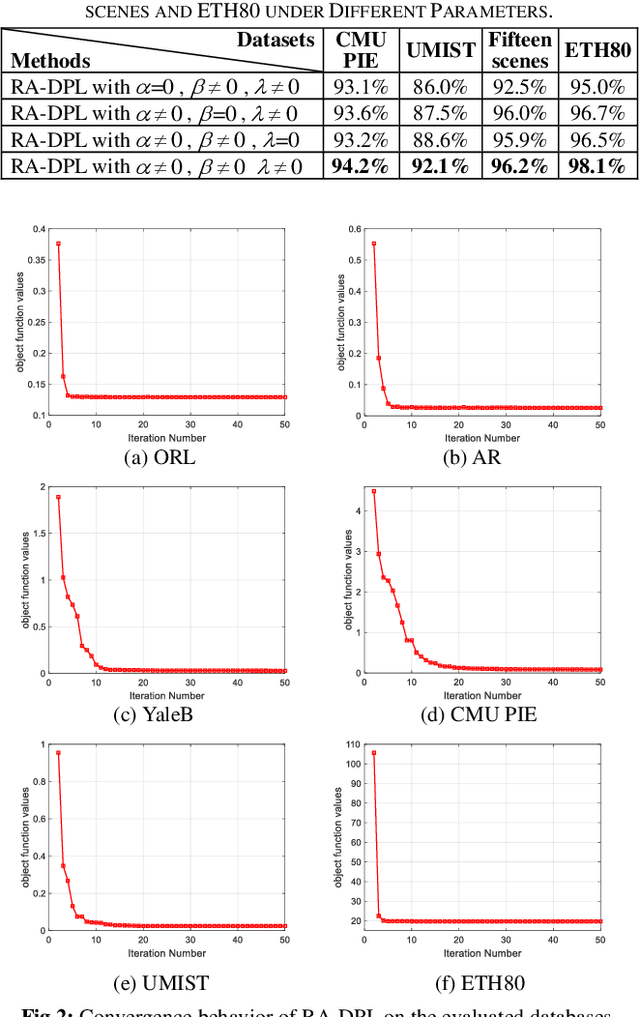
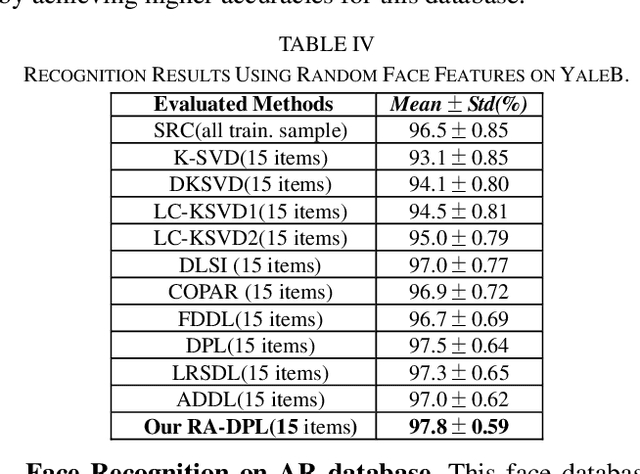
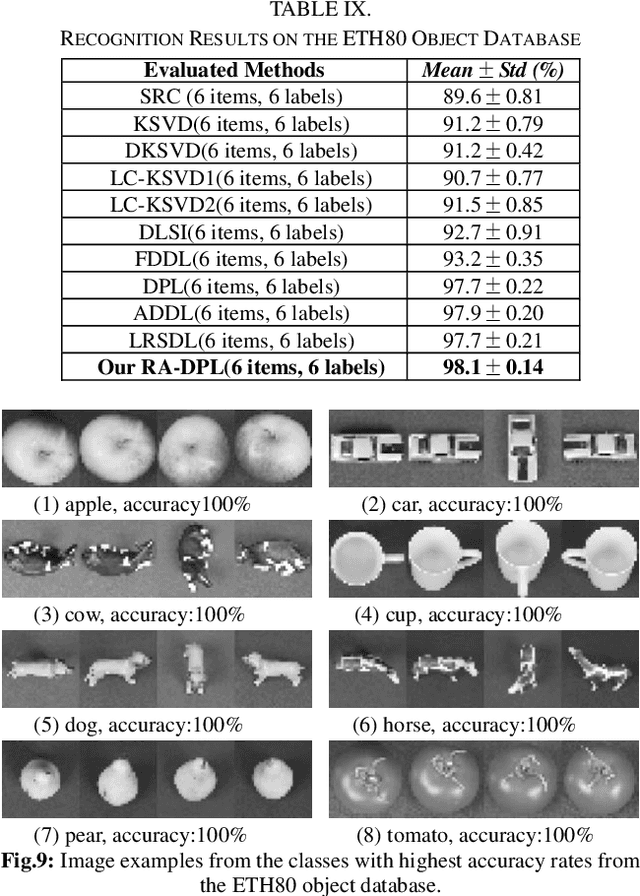
Abstract:In this paper, we propose a structured Robust Adaptive Dic-tionary Pair Learning (RA-DPL) framework for the discrim-inative sparse representation learning. To achieve powerful representation ability of the available samples, the setting of RA-DPL seamlessly integrates the robust projective dictionary pair learning, locality-adaptive sparse representations and discriminative coding coefficients learning into a unified learning framework. Specifically, RA-DPL improves existing projective dictionary pair learning in four perspectives. First, it applies a sparse l2,1-norm based metric to encode the recon-struction error to deliver the robust projective dictionary pairs, and the l2,1-norm has the potential to minimize the error. Sec-ond, it imposes the robust l2,1-norm clearly on the analysis dictionary to ensure the sparse property of the coding coeffi-cients rather than using the costly l0/l1-norm. As such, the robustness of the data representation and the efficiency of the learning process are jointly considered to guarantee the effi-cacy of our RA-DPL. Third, RA-DPL conceives a structured reconstruction weight learning paradigm to preserve the local structures of the coding coefficients within each class clearly in an adaptive manner, which encourages to produce the locality preserving representations. Fourth, it also considers improving the discriminating ability of coding coefficients and dictionary by incorporating a discriminating function, which can ensure high intra-class compactness and inter-class separation in the code space. Extensive experiments show that our RA-DPL can obtain superior performance over other state-of-the-arts.
Joint Subspace Recovery and Enhanced Locality Driven Robust Flexible Discriminative Dictionary Learning
Jun 11, 2019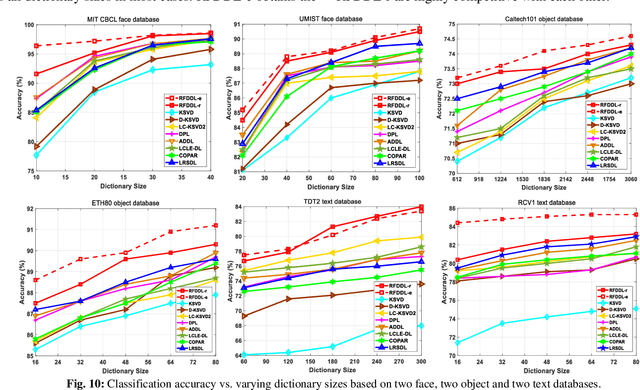

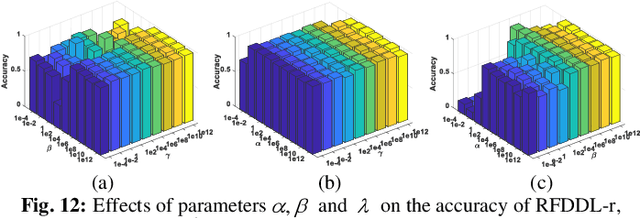

Abstract:We propose a joint subspace recovery and enhanced locality based robust flexible label consistent dictionary learning method called Robust Flexible Discriminative Dictionary Learning (RFDDL). RFDDL mainly improves the data representation and classification abilities by enhancing the robust property to sparse errors and encoding the locality, reconstruction error and label consistency more accurately. First, for the robustness to noise and sparse errors in data and atoms, RFDDL aims at recovering the underlying clean data and clean atom subspaces jointly, and then performs DL and encodes the locality in the recovered subspaces. Second, to enable the data sampled from a nonlinear manifold to be handled potentially and obtain the accurate reconstruction by avoiding the overfitting, RFDDL minimizes the reconstruction error in a flexible manner. Third, to encode the label consistency accurately, RFDDL involves a discriminative flexible sparse code error to encourage the coefficients to be soft. Fourth, to encode the locality well, RFDDL defines the Laplacian matrix over recovered atoms, includes label information of atoms in terms of intra-class compactness and inter-class separation, and associates with group sparse codes and classifier to obtain the accurate discriminative locality-constrained coefficients and classifier. Extensive results on public databases show the effectiveness of our RFDDL.
Jointly Learning Structured Analysis Discriminative Dictionary and Analysis Multiclass Classifier
May 27, 2019
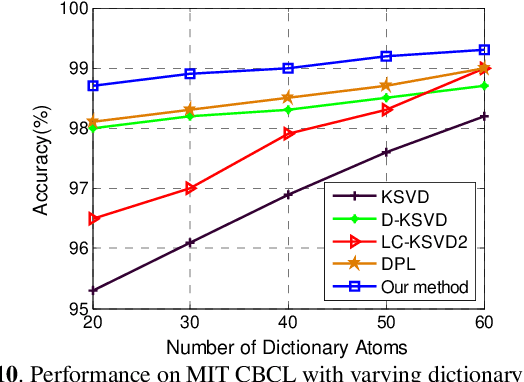


Abstract:In this paper, we propose an analysis mechanism based structured Analysis Discriminative Dictionary Learning (ADDL) framework. ADDL seamlessly integrates the analysis discriminative dictionary learning, analysis representation and analysis classifier training into a unified model. The applied analysis mechanism can make sure that the learnt dictionaries, representations and linear classifiers over different classes are independent and discriminating as much as possible. The dictionary is obtained by minimizing a reconstruction error and an analytical incoherence promoting term that encourages the sub-dictionaries associated with different classes to be independent. To obtain the representation coefficients, ADDL imposes a sparse l2,1-norm constraint on the coding coefficients instead of using l0 or l1-norm, since the l0 or l1-norm constraint applied in most existing DL criteria makes the training phase time consuming. The codes-extraction projection that bridges data with the sparse codes by extracting special features from the given samples is calculated via minimizing a sparse codes approximation term. Then we compute a linear classifier based on the approximated sparse codes by an analysis mechanism to simultaneously consider the classification and representation powers. Thus, the classification approach of our model is very efficient, because it can avoid the extra time-consuming sparse reconstruction process with trained dictionary for each new test data as most existing DL algorithms. Simulations on real image databases demonstrate that our ADDL model can obtain superior performance over other state-of-the-arts.
Scalable Block-Diagonal Locality-Constrained Projective Dictionary Learning
May 25, 2019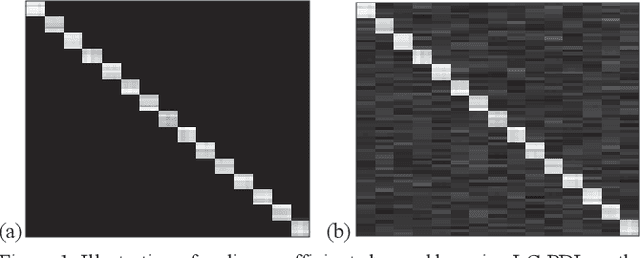
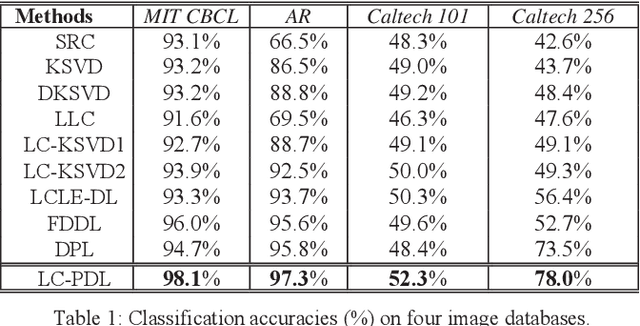
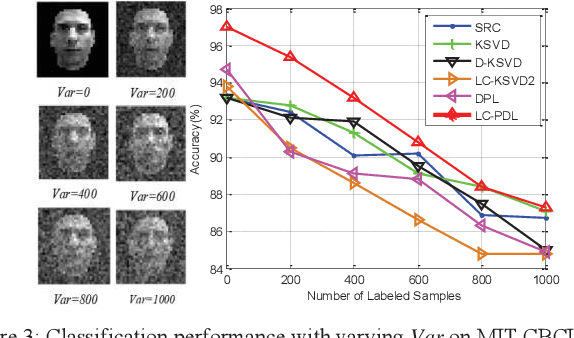
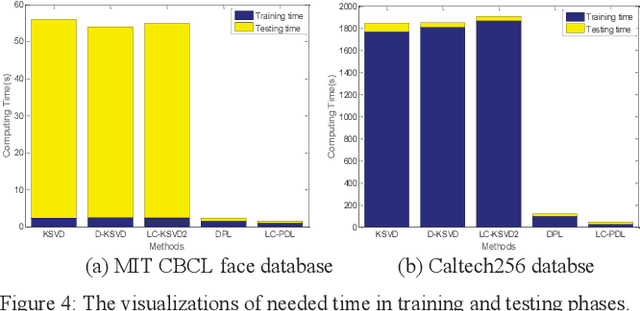
Abstract:We propose a novel structured discriminative block-diagonal dictionary learning method, referred to as scalable Locality-Constrained Projective Dictionary Learning (LC-PDL), for efficient representation and classification. To improve the scalability by saving both training and testing time, our LC-PDL aims at learning a structured discriminative dictionary and a block-diagonal representation without using costly l0/l1-norm. Besides, it avoids extra time-consuming sparse reconstruction process with the well-trained dictionary for new sample as many existing models. More importantly, LC-PDL avoids using the complementary data matrix to learn the sub-dictionary over each class. To enhance the performance, we incorporate a locality constraint of atoms into the DL procedures to keep local information and obtain the codes of samples over each class separately. A block-diagonal discriminative approximation term is also derived to learn a discriminative projection to bridge data with their codes by extracting the special block-diagonal features from data, which can ensure the approximate coefficients to associate with its label information clearly. Then, a robust multiclass classifier is trained over extracted block-diagonal codes for accurate label predictions. Experimental results verify the effectiveness of our algorithm.
 Add to Chrome
Add to Chrome Add to Firefox
Add to Firefox Add to Edge
Add to Edge